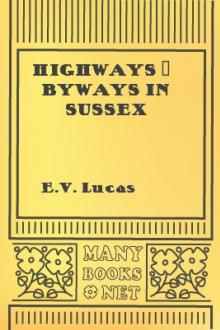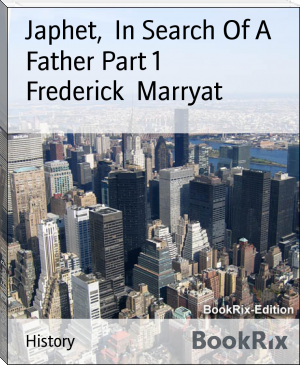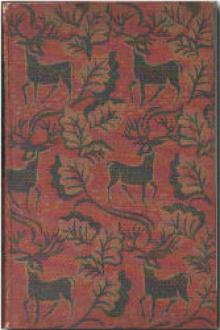Highways & Byways in Sussex by E. V. Lucas (e reader pdf best .txt) 📕

- Author: E. V. Lucas
- Performer: -
Book online «Highways & Byways in Sussex by E. V. Lucas (e reader pdf best .txt) 📕». Author E. V. Lucas
Four miles west of Robertsbridge, up hill and down, is Brightling, whose Needle, standing on Brightling Down, 646 feet high, is visible from most of the eminences in this part of Sussex. The obelisk, together with the neighbouring observatory, was built on the site of an old beacon by the famous Jack Fuller—famous no longer, but in his day (he died in 1834 aged seventy-seven) a character both in London and in Sussex. He was big and bluff and wealthy and the squire of Rose Hill. He sat for Sussex from 1801 to 1812, and was once carried from the House by the Sergeant at Arms and his minions, for refusing to give way in a debate and calling the Speaker "the insignificant little fellow in a wig." His election cost him £20,000 plus £30,000 subscribed by the county. When Pitt offered him a peerage he said no: "I was born Jack Fuller and Jack Fuller I'll die." When he travelled from Rose Hill to London Mr. Fuller's progresses were almost regal. The coach was provisioned as if for arctic exploration and coachman and footmen alike were armed with swords and pistols. ("Honest Jack," as Mr. Lower remarks, put a small value upon the honesty of others.) Mr. Fuller had two hobbies, music and science. He founded the Fullerian professorships (which he called his two children), and contributed liberally to the Royal Institution; and his musical parties in London were famous. But whether it is true that when the Brightling choir dissatisfied him he presented the church with nine bassoons, I cannot say.
John Fuller has a better claim to be remembered in Sussex by his purchase of Bodiam Castle, when its demolition was threatened, and by his commission to Turner to make pictures in the Rape of Hastings, five of which were engraved and published in folio form, in 1819, under the title Views in Sussex. One of these represents the Brightling Observatory as seen from Rosehill Park. As a matter of fact, the observatory, being of no interest, is almost invisible, although Mr. Reinagle, A.R.A., who supplies the words to the pictures, calls it the "most important point in the scene." Furthermore, he says that the artist has expressed a shower proceeding "from the left corner." Another picture is the Vale of Ashburnham, with the house in the middle distance, Beachy Head beyond, and in the foreground woodcutters carrying wood in an ox waggon. "The whole," says Mr. Reinagle, A.R.A., "is happily composed, if I may use the term." He then adds: "The eye of the spectator, on looking at this beautifully painted scene, roves with an eager delight from one hill to another, and seems to play on the dappled woods till arrested by the seat of Lord Ashburnham." Other pictures in the folio are "Pevensey Bay from Crowhurst Park," a very beautiful scene, "Battle Abbey," and "The Vale of Heathfield," painted from a point above the road, with Heathfield House on the left, the tower on the right, the church in the centre in the middle distance, and the sea on the horizon: an impressive but not strictly veracious landscape.
In Brightling church is a bust to John Fuller, with the motto: "Utile nihil quod non honestum." A rector in Fuller's early days was William Hayley, who died in 1789, a zealous antiquary. His papers relating to the history of Sussex, are now, like those of Sir William Burrell, in the British Museum.
Our next village is Burwash, three miles in the north, built, like all the villages in this switchback district, on a hill. We are now, indeed, well in the heart of the fatiguing country which we touched at Mayfield, where one eminence is painfully won only to reveal another. One can be as parched on a road in the Sussex hop country as in the Arabian desert. The eye, however, that is tired of hop poles and hills can find sweet gratification in the cottages. Sussex has charming cottages from end to end of her territory, but I think the hop district on the Kentish side has some of the prettiest. Blackberries too may be set down among the riches of the sand-hill villages.
In Richard Jefferies' essay, "The Country-side: Sussex" (in Field and Hedgerow), describing this district of the country, is an amusing passage touching superstitions of these parts, picked up during hopping:
"In and about the kiln I learned that if you smash a frog with a stone, no matter how hard you hit him, he cannot die till sunset. You must be careful not to put on any new article of clothing for the first time on a Saturday, or some severe punishment will ensue. One person put on his new boots on a Saturday, and on Monday broke his arm. Some still believe in herbs, and gather wood-betony for herb tea, or eat dandelion leaves between slices of dry toast. There is an old man living in one of the villages who has reached the age of a hundred and sixty years, and still goes hop-picking. Ever so many people had seen him, and knew all about him; an undoubted fact, a public fact; but I could not trace him to his lair. His exact whereabouts could not be fixed. I live in hopes of finding him in some obscure 'Hole' yet (many little hamlets are 'Holes,' as Froghole, Foxhole). What an exhibit for London! Did he realise his own value, he would soon come forth. I joke, but the existence of this antique person is firmly believed in."
Burwash is one of the few Sussex villages that has been made the subject of a book. The Rev. John Coker Egerton's Sussex Folk and Sussex Ways (from which I have already occasionally quoted) was written here, around materials collected during the author's period as rector of Burwash. Mr. Egerton was curate of Burwash from 1857 to 1862, and from 1865 to 1867, when he became rector and remained in the living until his death in 1888. His book is a kindly collection of the shrewd and humorous sayings of his Sussex parishioners, anecdotes of characteristic incidents, records of old customs now passing or passed away—the whole fused by the rector's genial personality.
It is to Burwash and Mr. Egerton that we owe some characteristic scraps of Sussex philosophy. Thus, Mr. Egerton tells of an old conservative whose advice to young men was this: "Mind you don't never have nothing in no way to do with none of their new-fangled schemes." Another Sussex cynic defined party government with grim impartiality: "Politics are about like this: I've got a sow in my yard with twelve little uns, and they little uns can't all feed at once, because there isn't room enough; so I shut six on 'em out of the yard while tother six be sucking, and the six as be shut out, they just do make a hem of a noise till they be let in; and then they be just as quiet as the rest."
The capacity of the Sussex man to put his foot down and keep it there, is shown in the refusal of Burwash to ring the bells when George IV., then Prince of Wales, passed through the village on his return to Brighton from a visit to Sir John Lade at Etchingham; the reason given being that the First Gentleman in Europe when rung in on his way to Sir John's had said nothing about beer. This must have been during one of the Prince's peculiarly needy periods, for the withholding of strong drink from his friends was never one of his failings. Another Burwash radical used to send up to the rectory with a message that he was about to gather fruit and the rector must send down for the tithe. The rector's man would go down—and receive one gooseberry from a basket of ten: all that was to be gathered that day.
Another Burwash man posed his vicar more agreeably and humorously in another manner. Finding him a little in liquor the pastor would have warned him against the habit, but the man was too quick. How was it, he asked the vicar with well affected or real concern, that whenever he had had too much to drink he felt more religious than at any other time?
The Burwash records indeed go far to redeem Sussex men from the epithet "silly," which is traditionally theirs. Concerning this old taunt, I like the rector's remarks in Idlehurst. The phrase, he says, "is better after all than 'canny owd Cummerlan'' or calling ourselves 'free and enlightened citizens' or 'heirs to all the ages.' But suppose Sussex as silly as you like, the country wants a large preserve of fallow brains; you can't manure the intellect for close cropping. Isn't it Renan who attributes so much to solid Breton stupidity in his ancestors?" I notice that Mr. H. G. Wells, in his very interesting book, Mankind in the Making, is in support of this suggestion. The Idlehurst rector, in contrasting Londoners with Sussex folk, continues: "The Londoner has all his strength in the front line: one can never tell what reserves the countryman may not deploy in his slow way." (Some old satirist of the county had it that the crest of the true Sussex peasant is a pig couchant, with the motto "I wunt be druv." I give this for what it is worth.)
It is to be doubted if any county has a monopoly of silliness. The fault of Sussex people rather is to lack reserves, not of wisdom but of effort. You see this in cricket, where although the Sussex men have done some of the most brilliant things in the history of the game (even before the days of their Oriental ally), they have probably made a greater number of tame attempts to cope with difficulties than any other eleven. For the "staying of a rot" Sussex has had but few qualifications. The cricket test is not everything: but character tells there just as in any other employment. Burwash, however, must be exempted from this particular charge, for, whatever its form may be now, its eleven had once a terrible reputation. I find in the county paper for 1771 an advertisement to the effect that Burwash, having "challenged all its neighbours without effect," invites a match with any parish whatsoever in all Sussex.
Mr. Egerton was not the first parson to record the manners of the Burwash parishioner. The Rev. James Hurdis, curate there towards the end of the preceding century, and afterwards Professor of Poetry at Oxford (we saw his grave at Bishopstone), had written a blank verse poem in the manner of Cowper, with some of the observation of Crabbe, entitled "The Village Curate," which is a record of his thoughts and impressions in his Burwash days. One could hardly say that "The Village Curate" would bear reprinting at the present time; we have moved too far from its pensiveness, and an age that does not read "The Task" and only talks about Crabbe is hardly likely to reach out for Hurdis. But within its limits "The Village Curate" is good, alike in its description of scenery, its reflections and





Comments (0)